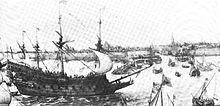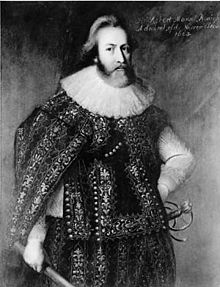Robert Mansell
Sir Robert Mansell , also Mansel , Mansfelt or Mansfield (* around 1570; † August 1652 ) was an English military, politician and businessman.
Origin and education
Robert Mansell came from the Welsh Mansel family and was born around 1570 as the fourth son of the Welsh country noble Edward Mansel and his wife Jane Somerset, a daughter of Henry Somerset, 2nd Earl of Worcester . Through the Gamages family from Coity, he was related to Lord High Admiral Charles Howard , later the Earl of Nottingham. Mansell's eldest brother Thomas inherited the family's extensive estates in South Wales after their father's death in 1585. Mansell studied at Brasenose College , Oxford in 1587 .
Career as a seafarer
Presumably Mansell went to sea under Admiral Charles Howard as a teenager. In 1591 he took part as a captain on a pirate trip to the West Indies . In 1596 he served as captain of the Royal Navy during the conquest of Cadiz . During the expedition he was knighted .
Norfolk landowner and admiral
Around 1593 he married Elizabeth Wyndham, daughter of Sir Nicholas Bacon and widow of Francis Wyndham, who left no direct heirs. Through this marriage Mansell was able to take over Wynhams property at Pentney in Norfolk, about eight miles from King's Lynn . Despite his connection to the Bacon and Gawdy families , he was only considered a newcomer there. Since he was often absent because of his frequent sea voyages and his presence at the royal court, he was initially only assigned the office of justice of the peace in Norfolk in 1593 . Only through the mediation of his patron Nottingham did he finally become Vice Admiral for Norfolk in 1599 . In the same year he supplied the English troops in Ireland with food from Plymouth and fought the rebels in County Waterford .
In October 1600 he had to answer for a duel with Sir John Heydon , a country noble from Norfolk, before the Privy Council . Heydon had lost a hand in the fight, while Mansell was so badly wounded in both arms that he could only use them to a limited extent afterwards. The cause of the duel was a political dispute, which is why he lost his office as justice of the peace. In 1601, however, he was elected to the House of Commons as MP for King's Lynn . In 1602 he was appointed Admiral of the Narrows . In this capacity he attacked in October 1602 together with the Dutch rebels under Jan van Cant a Spanish fleet in the Strait of Dover , where he was able to raise six Spanish ships.
Member of the House of Commons
After the death of his wife Elizabeth, Mansell left Norfolk and returned to his Welsh homeland. In March 1604 he had been elected Knight of the Shire for Carmarthenshire , where he was already tenant of Laugharne Castle and Kiffig Park . As a Member of Parliament, he supported his patron, Lord High Admiral Nottingham, but also campaigned for the promotion of seafaring, small ports and other naval interests.
Activity as naval treasurer
In October 1603 he planned together with John Trevor , with whom he had already undertaken a pirate expedition, to drive the naval treasurer Fulke Greville out of office, who aroused the displeasure of some members of the Navy Board with his attempts to curb corruption in the Navy would have. The support of Lord High Admiral Charles Howard, who also saw his position endangered by the Greville investigations, was crucial. After the senior minister Robert Cecil Greville withdrew his support, Greville had to give up his office. On April 26th, Mansell became his successor. During this intrigue he brought the explorer and navigator Walter Raleigh to Winchester , where he was sentenced to death but not initially executed. In 1605 he accompanied Nottingham to Spain, where he worked as an envoy.
As a naval treasurer, Mansell enriched himself unduly. As an example, he rented the Resistance ship , in which he was involved, at inflated prices for the Navy. He had it equipped at the navy's expense so that it could serve as a supply ship for the fleet, but in fact he used it as a private cargo ship. He sold offices, settled costs twice and increased the prices for provisions and equipment by up to 25% in his favor.
Mansell's corruption was one of the main reasons for the establishment of a commission of inquiry, which was particularly demanded by the Lord Seal Keeper Henry Howard, 1st Earl of Northampton . Henry Howard suspected Mansell of embezzling a total of £ 14,000 in his office . The investigation brought up further allegations such as bribery and extortion against Mansell, but it was ultimately abandoned in 1611 without result. That year Mansell had won the favor of the young heir to the throne, Prince Henry , whom he encouraged to keep looking for the Northwest Passage. However, the prince's death in November 1613 ruined the plans. When Mansell intrigued against a new commission of inquiry into the Navy in June 1613, he was arrested and brought to justice two weeks later. However, he was able to plead his innocence and, after confirming in writing that he would not again proceed against the royal right to a commission of inquiry, he was released.

He soon won the favor of the royal favorite Robert Carr, 1st Earl of Somerset . Somerset was married to a daughter of Thomas Howard, 1st Earl of Suffolk , who in 1591 was in command of the pirate voyage to the West Indies in which Mansell had participated. In the 1614 House of Commons elections, Mansell was re-elected as MP for Carmarthenshire.
Activity as a glass manufacturer
In 1615 he invested in the English glass industry, where his factories had a monopoly in London. At high cost, he founded new glass factories in Wollaston , Kimmeridge and Milford Haven , which, however, only brought high losses before his glass factories in Newcastle-upon-Tyne made a profit. When it became clear that his patron, the aged Lord High Admiral Nottingham , would be replaced by the young Earl of Buckingham , while Lord High Treasurer Thomas Howard, 1st Earl of Suffolk, was suspected of corruption, Mansell sold his office as in May 1618 Treasurer of the Navy to the merchant Sir William Russell. At that time he was making profits from his glass factories.
Expedition against the barbarians in the Mediterranean
His patron Nottingham secured before his replacement Mansell the office of Lieutenant of the Admiralty , the highest post in the Navy after the Lord High Admiral. The office was a sinecure , earning Mansell £ 322 a year in income, most of all protecting him against accusations of serving as treasurer. His opponents, especially John Coke, tried to hold him financially liable for his performance in office, but he managed to fend off the allegations. In July 1620 he became the commander of a fleet of 18 ships that were supposed to take action against the barbaric corsairs of Algiers in the Mediterranean. Together with his deputy Robert Hawkins and Rear Admiral Thomas Button , he set out on October 12 with six warships, ten merchant ships and two escort ships from Plymouth. The fleet reached Algiers on November 27th via Cádiz , Gibraltar , Malaga and Alicante . Negotiating them, they were able to free 40 British prisoners before the fleet had to retreat to Spanish ports to replenish its supplies. On May 21, 1621 Mansell appeared again with the fleet in front of Algiers and tried in vain to attack the port with fire . He then moved back to Alicante and reached England again at the end of July 1621. Because of this failure, he was heavily criticized by his opponents in England.
Rivalry with the Duke of Buckingham
In March 1617 he had married his lover Elizabeth Roper, who belonged to the Queen's court, in his second marriage. After 1620, its glass monopoly in England was broken by the admission of Scottish glassmakers. Since Mansell was unable to defend his privilege himself because of his naval command, his wife had to go to great lengths to renew the patent of his glass factories in 1623. In the general election of 1624 and 1625, Mansell was elected as Knight of the Shire for Glamorgan . In the House of Commons, he advocated a naval war against Spain . During the war he was a member of the council of war, but fell out with Buckingham. In the general election in 1626 Mansell ran for Lostwithiel , a constituency that was under the influence of William Herbert, 3rd Earl of Pembroke , Buckingham's adversary. In 1628 Mansell was re-elected for Glamorgan, and he subsequently settled the dispute with Buckingham. His hopes of getting an active post in the navy again were thwarted by the assassination of Buckingham.
Next life
In the years that followed, Mansell temporarily served as an adviser on naval issues, but on the other hand he was involved in his glass factories. After the English defeat at the Battle of Newburn in 1640, Newcastle was occupied by Scottish troops, which caused its glass factories to suffer a severe setback. In 1642 he finally lost his glass monopoly. In 1640 he no longer succeeded in being put up as a candidate for the parliamentary elections. He passed his old age in Greenwich , where he had lived since at least 1626, and died in August 1652. Since his widow was still doing business on his behalf, 1656 is sometimes incorrectly given as the year of his death. Both of his marriages had remained childless. He was buried in St Alfege Church in Greenwich.
Aftermath
Contemporaries judged him to be brave and honest despite all the criticism. The uninhabited Mansel Island at the entrance to Hudson Bay was named after him.
Modern historians are critical of his life. According to Julian Corbett 's tenure was as a naval treasurer unprecedented for embezzlement, while according to Alan Patrick McGowan his term would have almost led to disaster for the Royal Navy.
literature
- John Knox Laughton: Mansell, Robert , in: Dictionary of National Biography . Volume XXXVI . Macmillan, Smith, Elder & Co., London and New York 1893, p. 88
Web links
- NM Fuidge: MANSELL, Sir Robert (c.1569-1656), of Pentney and Norwich, Norf. and Penrice, Glam. (History of Parliament Online, Ref Volumes: 1558–1603)
- Andrew Trush: MANSELL (MANSFIELD, MANSFELT), Sir Robert (1570 / 1-1652), of Pentney, Norf .; Marquess House, Broad Street, London; and Church Street, Croom's Hill, East Greenwich, Kent. (History of Parliament Online; Ref Volumes: 1604–1629)
Individual evidence
- ↑ Linda Levy Peck: Court Patronage and Corruption in Early Stuart England. Routledge, London 2003. ISBN 1-134-87042-6 , p. 117
- ^ History of Parliament Online: Mansell (Mansfield, Mansfelt), Sir Robert (1570 / 1-1652). Retrieved January 28, 2015 .
| personal data | |
|---|---|
| SURNAME | Mansell, Robert |
| ALTERNATIVE NAMES | Mansel, Robert; Mansfield, Robert; Mansfelt, Robert |
| BRIEF DESCRIPTION | English military, politician and businessman |
| DATE OF BIRTH | around 1570 |
| DATE OF DEATH | August 1652 |

